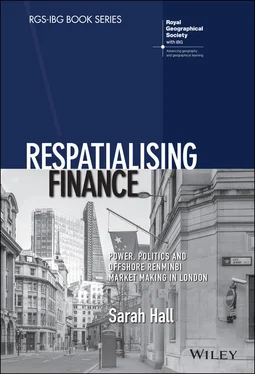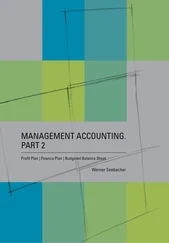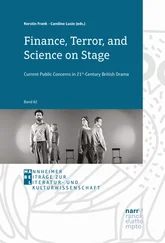Sarah Hall - Respatialising Finance
Здесь есть возможность читать онлайн «Sarah Hall - Respatialising Finance» — ознакомительный отрывок электронной книги совершенно бесплатно, а после прочтения отрывка купить полную версию. В некоторых случаях можно слушать аудио, скачать через торрент в формате fb2 и присутствует краткое содержание. Жанр: unrecognised, на английском языке. Описание произведения, (предисловие) а так же отзывы посетителей доступны на портале библиотеки ЛибКат.
- Название:Respatialising Finance
- Автор:
- Жанр:
- Год:неизвестен
- ISBN:нет данных
- Рейтинг книги:5 / 5. Голосов: 1
-
Избранное:Добавить в избранное
- Отзывы:
-
Ваша оценка:
- 100
- 1
- 2
- 3
- 4
- 5
Respatialising Finance: краткое содержание, описание и аннотация
Предлагаем к чтению аннотацию, описание, краткое содержание или предисловие (зависит от того, что написал сам автор книги «Respatialising Finance»). Если вы не нашли необходимую информацию о книге — напишите в комментариях, мы постараемся отыскать её.
Respatialising Finance
Respatialising Finance
Respatialising Finance — читать онлайн ознакомительный отрывок
Ниже представлен текст книги, разбитый по страницам. Система сохранения места последней прочитанной страницы, позволяет с удобством читать онлайн бесплатно книгу «Respatialising Finance», без необходимости каждый раз заново искать на чём Вы остановились. Поставьте закладку, и сможете в любой момент перейти на страницу, на которой закончили чтение.
Интервал:
Закладка:
131 119
132 120
133 121
134 122
135 123
136 124
137 125
138 126
139 127
140 128
141 129
142 130
143 131
144 132
145 133
146 134
147 135
148 136
149 137
150 138
151 139
152 140
153 141
154 142
155 143
156 144
157 145
158 146
159 147
160 148
161 149
162 150
163 151
164 152
165 153
166 154
167 155
168 156
169 157
170 158
171 159
172 160
173 161
174 162
175 163
176 164
177 165
178 166
179 167
180 168
181 169
182 170
183 171
184 172
185 173
186 174
List of Figures
Figure 4.1 Monetary form, geographical reach and policy basis of RMB internationalisation
Figure 5.1 Renminbi business of UK monetary financial institutions (2015–2020, £m)
Figure 5.2 RMB foreign exchange daily turnover in London by instrument (2015–2020, £m)
Figure 5.3 Timeline of London’s development as an offshore RMB centre
Figure 6.1 National insurance registrations of Chinese nationals by London borough 2002–2016
Figure 6.2 Location of Chinese financial and related professional service firms in London’s financial district
List of Tables
Table 4.1 Attributes of leading offshore RMB centres
Table 4.2 List of interviewees
Table 5.1 Factors accounting for the identification of London as the first western offshore RMB centre
Table 6.1 Big four Chinese commercial state-owned banks operating in London, by Tier 1 capital
Table 7.1 RQFII licences issued in London 2013–2014 (RMBbn)
Table 7.2 Allocated and used RQFII quotas by country (US$bn)
Series Editors’ Preface
The RGS-IBG Book Series only publishes work of the highest international standing. Its emphasis is on distinctive new developments in human and physical geography, although it is also open to contributions from cognate disciplines whose interests overlap with those of geographers. The Series places strong emphasis on theoretically-informed and empirically-strong texts. Reflecting the vibrant and diverse theoretical and empirical agendas that characterize the contemporary discipline, contributions are expected to inform, challenge and stimulate the reader. Overall, the RGS-IBG Book Series seeks to promote scholarly publications that leave an intellectual mark and change the way readers think about particular issues, methods or theories.
For details on how to submit a proposal please visit:
www.rgsbookseries.com
Ruth Craggs, King’s College London, UK
Chih Yuan Woon, National University of Singapore
RGS-IBG Book Series Editors
David Featherstone
University of Glasgow, UK
RGS‐IBG Book Series Editor (2015–2019)
Acknowledgements
The research that underpins this book draws on an extensive period of fieldwork conducted with policymakers and financiers working in London and Beijing dating back to 2015. I would like to thank all the people I interviewed who gave up their time to be interviewed and talked me through the issues they were facing in their everyday work with care and patience. As a result, I learnt more about the intricacies of RMB internationalisation and London’s role within it than I could have ever done through reading secondary sources. Over the course of the research, I shared these insights with Fenghua Pan, and I would like to express thanks for Fenghua for sharing his incredible knowledge of the Chinese banking and financial system with me and hosting me at the early stages of the project at Beijing Normal University.
The research would not have been possible without the financial support of The British Academy through a Mid-Career Fellowship (award number MD 13006) and a period of research leave from the School of Geography at the University of Nottingham that gave me the time to learn about RMB internationalisation and London’s role within it. My colleagues at the University of Nottingham have been extremely supportive in terms of giving me the time to undertake this work and I would particularly like to thank Louise Crewe, Shaun French and Andrew Leyshon who have supported me through the good times and the trickier ones. The arguments presented here have benefited from conference audiences at a number of events where I presented preliminary ideas. I would particularly like to thank those at the Universities of Durham, Manchester, Cambridge and Newcastle as well as colleagues who attended meetings of the Royal Geographical Society with the Institute of British Geographers, the American Association of Geographers, the Global Conference in Economic Geography and the Global Network on Financial Geography. Through these events, I’m lucky to be supported by a wider network of financial and economic geographers that I feel very lucky to be a part of. Comments throughout the project from Karen Lai, Kean Fan Lim, Paul Langley and Adam Leaver have been incredibly helpful in refining the arguments in the book.
I would also like to acknowledge the support and patience of David Featherstone and Jacqueline Scott within the RGS-IBG book series team for their support and above all patience as I tried to complete this text. This has been particularly true as the final revisions to the book coincided with the coronavirus pandemic in the UK. As I tried to juggle completing the revisions with looking after my children the book would not have been possible without the support of my family (especially Mike, who has heard more about RMB internationalisation than he ever wanted to) and friends at home in looking after Raffi, Clemmie and Gus. This is for the three amigos.
Chapter One Global Monetary Transformation and Respatialising the Geographies of Finance
Respatialising Finance positions international financial centres as vital – but often overlooked – analytical lenses through which to understand the changing position of Chinese finance within the international financial system and specifically the internationalisation of its currency, the renminbi (RMB). In so doing, I develop a revitalised reading of financial centres that places questions of the state, politics and power more centrally in both their own internal dynamics and in their role in shaping global finance. Since the 2007–2008 financial crisis, the growing internationalisation of the RMB has been one of the most significant developments within global monetary relations. Indeed, in 2014, Deutsche Bank argued that the internationalisation of the RMB was the most significant development in international monetary affairs since the launch of the euro in 1999 (Deutsche Bank 2014). It refers to the relatively rapid and recent transformation in the geography of the Chinese currency facilitated through Chinese state support in the form of the People’s Bank of China in particular. This geography has been transformed from a situation in the early 2000s in which flows of RMB in and out of mainland China were heavily restricted to one in which, by July 2020, it was the fifth most commonly used currency for payments internationally behind the US dollar, sterling, the euro and the yen (SWIFT 2020). Meanwhile, the growing international status of the RMB was also reflected in the International Monetary Fund including the RMB in its basket of special drawing rights (SDR) from October 2016 together with the US dollar, the euro, the yen and sterling. Kirshner (2014: 220) provides a valuable summary of the early motivations and uncertainties surrounding RMB internationalisation:
Читать дальшеИнтервал:
Закладка:
Похожие книги на «Respatialising Finance»
Представляем Вашему вниманию похожие книги на «Respatialising Finance» списком для выбора. Мы отобрали схожую по названию и смыслу литературу в надежде предоставить читателям больше вариантов отыскать новые, интересные, ещё непрочитанные произведения.
Обсуждение, отзывы о книге «Respatialising Finance» и просто собственные мнения читателей. Оставьте ваши комментарии, напишите, что Вы думаете о произведении, его смысле или главных героях. Укажите что конкретно понравилось, а что нет, и почему Вы так считаете.












